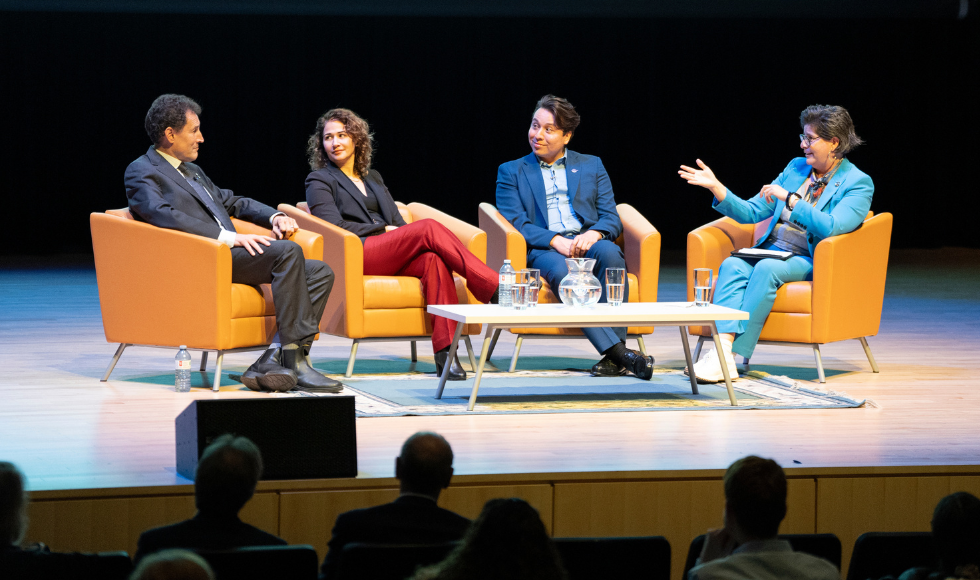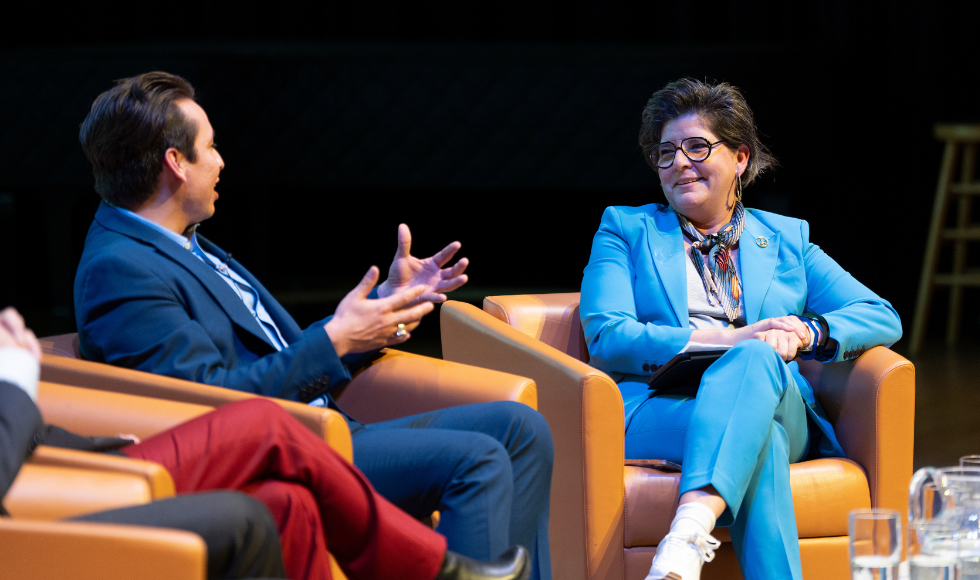‘See where the wisdom is’ — Wilson College’s first public event explores the nature of leadership

From left: Steve Paikin, Medora Uppal, Mark Hill and Sara Wolfe held a free-flowing and insightful discussion about the past and future of leadership in Canada.
At the Wilson College of Leadership and Civic Engagement’s first public event, community members and visitors enjoyed a free-flowing conversation on effective leadership styles, the challenges facing today’s youth and the role of the college and other institutions in nurturing future leaders.
Mark Hill, former elected chief of Six Nations of the Grand River; Steve Paikin, journalist and host of TVO’s The Agenda; and Medora Uppal, chief executive officer of YWCA Hamilton, joined moderator and Wilson College external director Sara Wolfe for a panel discussion around leadership, civic engagement, and the important connections between the two.
Strong, meaningful connections
Every effective leader is able to connect with people in meaningful ways, the panellists agreed.
Paikin, who has scrutinized his fair share of politicians, has written biographies of former Ontario premiers John Robarts and Bill Davis.
What separated their leadership styles from later leaders like Mike Harris was governing by consensus, Paikin said.
“Robarts and Davis looked at society and looked for the sweet spot of maximum buy-in.”
Hill, the youngest elected Chief of Six Nations of the Grand River, spoke of connecting with people by identifying and addressing issues they were facing.
“I recognize the challenges of my community — of no drinking water, of poverty,” he said. “I want to be part of the collective solution to issues in the community.”
For Uppal, strengthening connections means making room for everyone to feel they can play a role in overcoming challenges, even if that includes having difficult conversations.
“We need everybody in, and to find a space to move forward,” she said. “Allyship is not always about agreeing, but working together.”

The next generation of leaders
The panel also discussed how society and ideas of leadership have changed and continue to evolve.
“Real leaders look at the whole room and see where the wisdom is,” Uppal said. “They sit in circles, they don’t lead the pack.”
A good leader moves towards a collaborative, collective style, rather than that patriarchal “front of the pack mentality,” she said, and spoke of the Centre for Feminist Research and Evaluation, a collaboration between the YWCA and the Faculty of Social Sciences’ Community Research Platform.
Advice for today’s youth
While attitudes may be slowly changing for the better, all three panellists acknowledged that young people starting their leadership journeys face new challenges.
“It’s going to be different, and in many ways harder,” said Paikin, who pointed out that he might not spend 42 years in a single career if he were starting out today, especially with the decline of legacy media and the impact of social media.
Young leaders may have many different careers, and can find rewards in their diverse experiences, he said.
“You can make it a wonderful journey.”
Young people will have to pivot as they navigate the world, Hill agreed.
“There is no perfect pathway to leadership.”
The role of Wilson College
In his remarks following the panel discussion, Wilson College academic director Donald Abelson spoke of how the College would support the next generation of leaders by instilling in them the confidence to lead and address the challenges facing Canada and the world.
“My mother used to say, ‘You are born with a mouth, but it takes time to find your voice,’ ” he said. “At Wilson College, we want to help young people find their voices.”
The Wilson College of Leadership and Civic Engagement is an interdisciplinary college offering Canada’s only combined Honours Bachelor of Arts degree (launching Fall 2025) and a minor in Leadership and Civic Studies. It aims to equip future leaders with the skills and knowledge to face the challenges of tomorrow.


